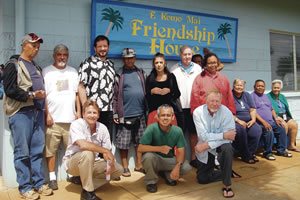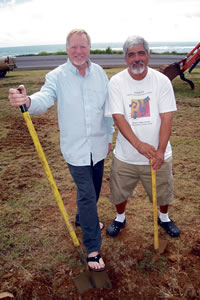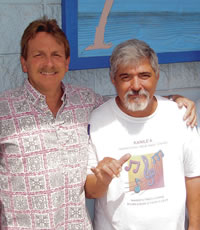Building Esteem For The Mentally Ill

Jack Yatsko (front, left), Wayne Law (back, third from left) and Dennis Beckel (front, right) with members of Friendship Clubhouse in Kapaa
Jack Yatsko is determined to break down the stigma associated with mental illness.
As chief operating officer of International Center Clubhouse Development, he has been assisting those afflicted with mental illness on Kaua’i for more than 20 years. He aids in the development of certain aspects of their lives such as work, education or independent living through Friendship House in Kapa’a.
“There are a lot of people who come here and feel like they’re not very good at anything,” says Yatsko regarding the nonprofit where he worked for some 13 years prior to his current position helping the development of clubhouses across the globe for 10 years.
The island’s Friendship House, where Yatsko spends much of his time, is one of 350 clubhouse model programs in 31 countries he helps oversee.
Those who suffer from mental illnesses can become members of these organizations and gain opportunities they might not otherwise receive.
“It’s an intentional community of like-minded people who come together to support each other, and that support is very wide-ranging,” says Yatsko, a licensed social worker.
On any given day, an average of 40 members are at the local nonprofit voluntarily answering phones, preparing food in the kitchen and creating newsletters.
“Through these opportunities, people build up self-esteem, confidence and their social relationships, and then they start to feel more comfortable to go back out in the general community,” says Yatsko, who lives here but frequently travels for work.Everyone wants to feel accepted, and Friendship House is a place where people can experience that sense of belonging.
“That’s a common thing among human beings to have a sense of connectedness to the larger society. And people with mental illnesses generally tend to be ostracized because of the illness,” says Yatsko, who with wife Janece has two children. “We want to be part of that fabric of the community; we don’t want to be isolated. We want to be integrated where everybody else is.”
Some 86 members of the island’s club not only get a chance to develop work skills together, they also celebrate holidays and enjoy outings with one another, like going to the movies.
“It mirrors general society,” says Yatsko. “We work hard and play hard in the clubhouse.”
Friendship House was the first of its kind in the state and originated in 1988 on the grounds of Samuel Mahelona Memorial Hospital. The nonprofit moved to its current location in 1998. There are currently 10 clubhouses across the state with approximately 1,000 members. The clubhouse model provides support and draws upon the talents, skills and abilities of its members, who are 18 years and older.

Former director of Friendship House Dennis Beckel and clubhouse member Daniel Pimental have been working hard at developing a garden for the nonprofit
Pimental is currently excited to be instrumental in creating a new garden on the Friendship House grounds.
“I think the greatest type of rehabilitation we can offer is the experience of being needed,” says Yatsko, who was originally hired as a social worker at Friendship House in 1989. His ambition, however, drove him to create its first transitional employment placement program.
The national average of employing those with mental illnesses is about 15 percent. In clubhouses, however, the average is close to 45 percent.
“Jack is a passionate man who gives 200 percent to the causes that he believes in,” says Friendship House social worker and interim director, Iris Ijima. “Work, family, friends and the community … with all that he does, Friendship House is lucky that he is based here on Kaua’i and we have unlimited access to the expertise that he so unselfishly shares.”




